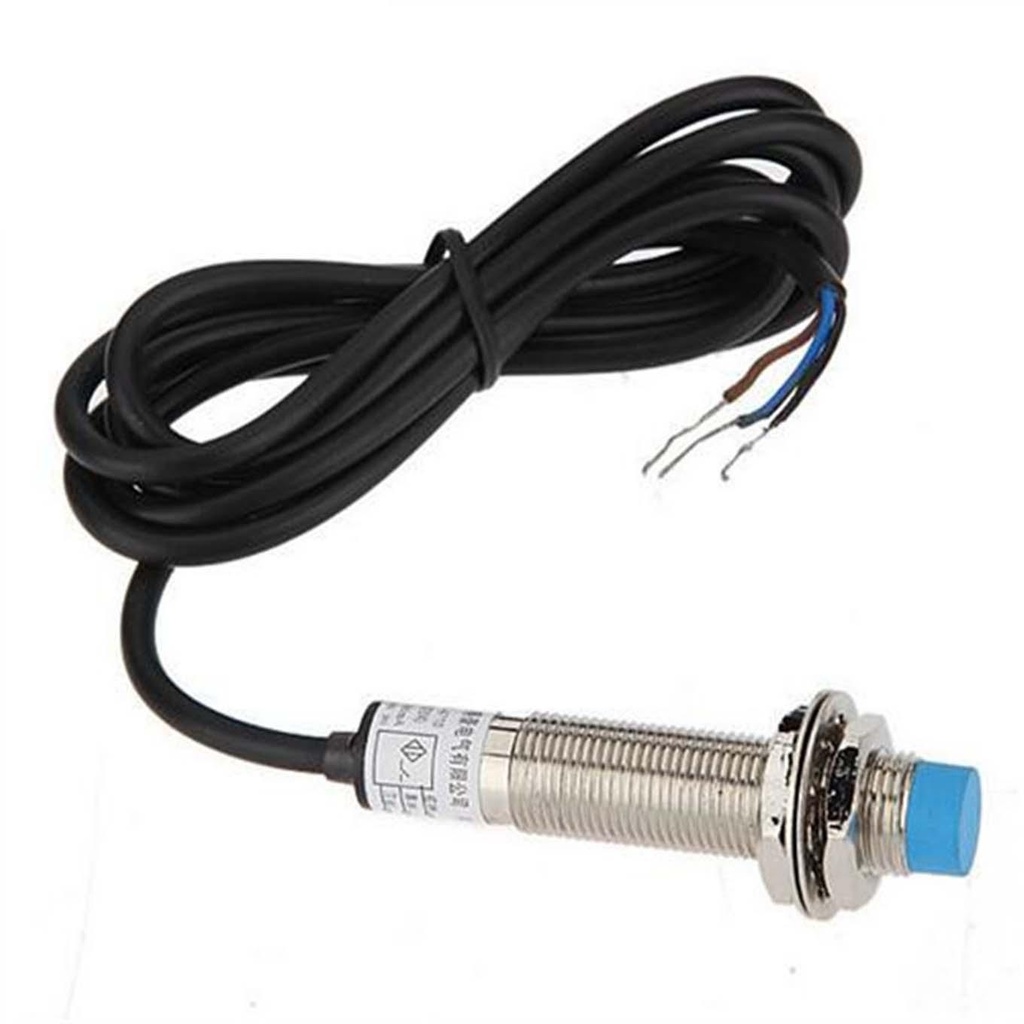Features:
- Detects metallic objects without touching them using electromagnetic induction
- Detection distance: 4mm
- High precision detection of large metal fields
- Red LED indicator lights up when a metallic object is detected
- NPN Normally Open (NO) type output
- Operating voltage: 6–36V DC or 5V DC
- Output current: 300mA (DC), 400mA (AC)
- Standard detected object: Mild steel (12×12×1mm)
- Response frequency: 500Hz
- M12 threaded body for easy mounting
- IP65 rated for dust and water resistance
- Operating temperature: -25 to 70 °C (-13 to 158 °F)
- Reverse connection protection included
Principle of Work:
This sensor operates using electromagnetic induction. It generates a high-frequency magnetic field via an internal coil. When a metallic object enters this field, eddy currents are induced in the object, disturbing the original magnetic field. The sensor detects this disturbance and outputs a digital signal (connected to ground) to indicate detection. Only metallic objects are detectable.
Pinout of the Module:

- VCC: Power supply 6-36V DC (Brown wire)
- GND: Ground (Blue wire)
- OUT: Digital output (Black wire)
Applications:
- 3D Printers: Bed leveling and object detection (e.g., aluminum heated bed)
- CNC Machines: Tool and workpiece position sensing
- Robotics: Metal object detection in industrial paths
- Conveyor Systems: Sorting and detection of metal parts, cans, bottles
- Security Systems: Detection of weapons or metallic items
Circuit Diagram:

- Sensor to Arduino:
- VCC → VCC
- GND → GND
- OUT → A2
- Resistor: 10KΩ pull-up resistor on output line
Library:
No library required to use with Arduino
Example Arduino Code:
const int Pin = 2;
void setup() {
pinMode(Pin, INPUT);
Serial.begin(9600);
}
void loop() {
int sensorValue = digitalRead(Pin);
if (sensorValue == HIGH) {
Serial.println("no Object");
} else {
Serial.println("Object Detected");
}
delay(500);
}
Code Explanation:
- Pin: Connected to the sensor’s OUT pin (Digital Pin 2)
- setup(): Initializes the pin and serial communication
- loop(): Continuously checks sensor state and prints message
Technical Specifications:
- Detection distance: 4mm
- Setting distance: 0–3.2 mm
- Supply voltage: 6–36V DC or 5V DC; AC versions: 90–250V, 36V, 380V
- Output current: 300mA max (DC), 400mA (AC)
- Standard detected object: Mild steel (12×12×1mm)
- Sensing object: Magnetic metals preferred
- Response frequency: 500Hz
- Output indication: Red LED
- Short-circuit protection: Not included
- Reverse connection protection: Yes
- Insulation resistance: ≥50MΩ
- Dielectric strength: 1000VAC, 1 min
- Mounting: M12 bracket
- IP Rating: IP65
- Operating Temperature: -25 to 70°C
Comparisons:
- LJ12A3-4-Z/BX (Inductive Sensor):
- Works by electromagnetic field interaction
- Detects only metallic objects (preferably magnetic)
- Short detection range: 4mm
- Commonly used in 3D printers and CNC machines
- Photoelectric/Infrared Sensors:
- Work using light reflection
- Detect metallic and non-metallic objects
- Longer detection range (up to several meters)
- Used in doors, vending machines, security systems
Resources:
Features:
- Detects metallic objects without touching them using electromagnetic induction
- Detection distance: 4mm
- High precision detection of large metal fields
- Red LED indicator lights up when a metallic object is detected
- NPN Normally Open (NO) type output
- Operating voltage: 6–36V DC or 5V DC
- Output current: 300mA (DC), 400mA (AC)
- Standard detected object: Mild steel (12×12×1mm)
- Response frequency: 500Hz
- M12 threaded body for easy mounting
- IP65 rated for dust and water resistance
- Operating temperature: -25 to 70 °C (-13 to 158 °F)
- Reverse connection protection included
Principle of Work:
This sensor operates using electromagnetic induction. It generates a high-frequency magnetic field via an internal coil. When a metallic object enters this field, eddy currents are induced in the object, disturbing the original magnetic field. The sensor detects this disturbance and outputs a digital signal (connected to ground) to indicate detection. Only metallic objects are detectable.
Pinout of the Module:

- VCC: Power supply 6-36V DC (Brown wire)
- GND: Ground (Blue wire)
- OUT: Digital output (Black wire)
Applications:
- 3D Printers: Bed leveling and object detection (e.g., aluminum heated bed)
- CNC Machines: Tool and workpiece position sensing
- Robotics: Metal object detection in industrial paths
- Conveyor Systems: Sorting and detection of metal parts, cans, bottles
- Security Systems: Detection of weapons or metallic items
Circuit Diagram:

- Sensor to Arduino:
- VCC → VCC
- GND → GND
- OUT → A2
- Resistor: 10KΩ pull-up resistor on output line
Library:
No library required to use with Arduino
Example Arduino Code:
const int Pin = 2;
void setup() {
pinMode(Pin, INPUT);
Serial.begin(9600);
}
void loop() {
int sensorValue = digitalRead(Pin);
if (sensorValue == HIGH) {
Serial.println("no Object");
} else {
Serial.println("Object Detected");
}
delay(500);
}
Code Explanation:
- Pin: Connected to the sensor’s OUT pin (Digital Pin 2)
- setup(): Initializes the pin and serial communication
- loop(): Continuously checks sensor state and prints message
Technical Specifications:
- Detection distance: 4mm
- Setting distance: 0–3.2 mm
- Supply voltage: 6–36V DC or 5V DC; AC versions: 90–250V, 36V, 380V
- Output current: 300mA max (DC), 400mA (AC)
- Standard detected object: Mild steel (12×12×1mm)
- Sensing object: Magnetic metals preferred
- Response frequency: 500Hz
- Output indication: Red LED
- Short-circuit protection: Not included
- Reverse connection protection: Yes
- Insulation resistance: ≥50MΩ
- Dielectric strength: 1000VAC, 1 min
- Mounting: M12 bracket
- IP Rating: IP65
- Operating Temperature: -25 to 70°C
Comparisons:
- LJ12A3-4-Z/BX (Inductive Sensor):
- Works by electromagnetic field interaction
- Detects only metallic objects (preferably magnetic)
- Short detection range: 4mm
- Commonly used in 3D printers and CNC machines
- Photoelectric/Infrared Sensors:
- Work using light reflection
- Detect metallic and non-metallic objects
- Longer detection range (up to several meters)
- Used in doors, vending machines, security systems
Resources:


